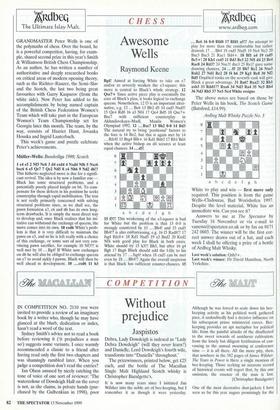COMPETITION
Without prejudice Jaspistos
IN COMPETITION NO. 2110 you were invited to provide a review of an imaginary book by a writer who, though he may have glanced at the blurb, dedication or index, hasn't read a word of the text.
Sydney Smith's advice not to read a book before reviewing it ('it prejudices a man so') suggests some variants. I once warmly recommended a classic to a friend after having read only the first two chapters and was shamingly rumbled later. When you judge a competition don't read the entries?
Ian Olson amused by nicely catching the tone of voice of one sort of reviewer: `The watercolour of Dowdeigh Hall on the cover is not, as she claims, in private hands (pur- chased by the Gulbenkian in 1998), poor Debra, Lady Dowdeigh is indexed as "Lady Debra Dowdeigh" (will they never learn?) and Danielle, Lord Dowdeigh's fourth wife, transforms into "Danielle" throughout.'
The prizewinners, printed below, get £25 each, and the bottle of The Macallan Single Malt Highland Scotch whisky is Christopher Bazalgette's.
It is now many years since I initiated Jim Wilsher into the noble art of bee-keeping, but I remember it as though it were yesterday.
Although he was forced to scale down his bee- keeping activity as his political work gathered pace, it undoubtedly had a decisive influence on his subsequent prime ministerial career. Bee- keeping provides an apt metaphor for political life: from the painful attacks of the disaffected to the sweet rewards of assiduous cultivation, from the lonely but diligent fertilisation of can- vassing to the annual swarming at conference time — it is all there. All the more pity, then, that nowhere in the 582 pages of James Wilsher: The Years in Power is there a single mention of bee-keeping. Those seeking an accurate record of historical events will regret that, by this one omission, the essence of the man is lost.
(Christopher Bazalgette) One of the most decorative dust-jackets I have seen so far this year augurs promisingly for the
contents of Alison Dumbwill's latest addition to her 'Tales from the Windmill' series, originally launched in 1975. To have maintained the momentum of any series over nearly a quarter of a century is, in itself, a remarkable feat of author- ship. Strangers to Ms Dumbwill's fictionalised corner of 18th-century Berkshire will, I am sure, rapidly declare their new-found allegiance. As for established admirers, they will be happy to find many of the familiar characters up to their usual comic subterfuges as they do battle with the trials of rural life. Comparisons with the immortal Jane are inevitable and are not necessarily strained. But Ms Dumbwill has her own voice and those who anticipate simple a pale pastiche of Sense and Sensibility and the rest may not find their expecta-
tions fulfilled. (Fergus Porter)
The New Global History of World War Il is ency- clopaedic in its range, covering all theatres of action, and spreading its narrative over 1,400 Pages to compose a detailed survey of more than six and a half years of warfare in Europe and else- where. Graphic illustrations accompany the text. The contributors, who number among them senior army officers and staff writers for reputable maga- zines, take us to the frozen hell of Stalingrad as well as the parched deserts of North Africa and the teeming, humid jungles of the Far East. Justice
is done to all the belligerent nations and the out- come of the conflict is disclosed in the final chap- ter. Some attention is also paid to the significance of the postwar settlement. There is little doubt that this comprehensive volume will take its due place among the manifold differing analyses of a major historical event. (G.M. Davis)
It seems churlish to criticise the fruit of 15 years' research, including two at Waterloo; yet Leonard Pennyfather's Wellington has some startling asser- tions and omissions. For instance, the claim (bla- zoned on the cover) that Wellington was 'surpris- ingly open to scientific progress' sits ill with the Duke's intemperate outburst against false teeth 'and all that damned mountebank stuf in 1836 (this story — true, I firmly believe — is discussed in my own biography). And why 19 detailed refer- ences to the Marquess of Anglesey's military and political career, but no mention of the tradition — again, I am convinced, authentic — that the Marquess's amputated leg was cremated forth- with, and the urn exhibited on his breakfast side- board till it vanished in the wake of a hushed-up Chartist raid? Nonetheless, this devoted work, 1,257 pages long and weighing over five pounds, has numerous points of interest. The dedication to the author's daughter, Talavera, is charming.
(Chris Tingley)
Nation and Tribalism in Africa: The empires have long been thrown off, and Africa ends our present century as a continent of independent nations. Yet tribalisM impacts upon this modern polity. What is the nature of this impact? (And , indeed, what is its cause?) The author has sought to address the relevant issues and provide the appro- priate contexts, all the while exhibiting a purpose- ful combination of historical fact and scholarly method. Where such a broad topic is concerned it is inevitable that some academic judgments must be called into question: why, for example, is dis- cussion of Abyssinia allowed a mere two pages, while the author provides a full 24 references to Zimbabwe? Nevertheless, one cannot but acknowledge the sheer weight of scholarship underpinning the production of this handsome volume, which runs to an impressive 874 pages
plus bibliography. (Philip Irwin)
No. 2113: Hotel Galactica
A German-American concern is planning to build a hotel 300 miles above Earth, com- plete with stellar deckchairs, to be opened by 2020. Space suits not necessary. You are invited to supply extracts from the diary of a future tourist. Maximum 150 words. Entries to 'Competition No. 2113' by 25 November.



























































































 Previous page
Previous page